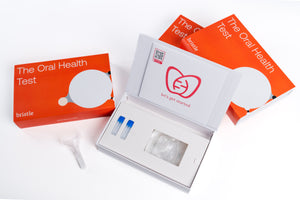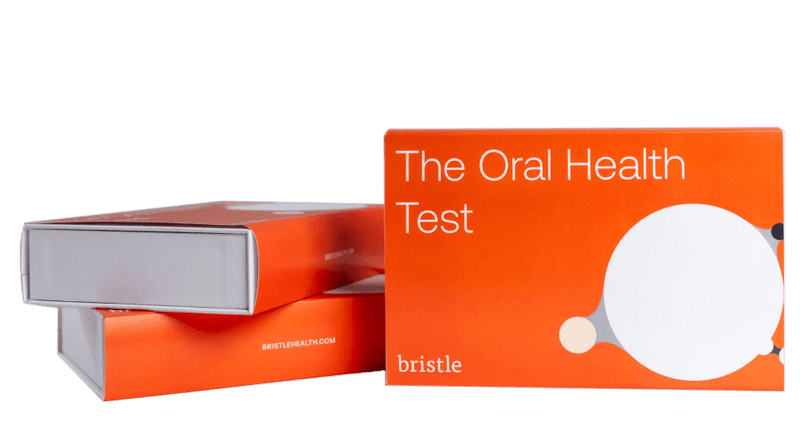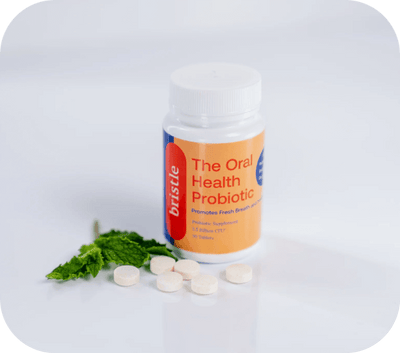You try everything to get rid of of bad breath, including maintaining good dental hygiene, using mouthwash, chewing gum, and mints, but the symptoms persist. 90% of chronic bad breath, or halitosis, is caused by an imbalance of certain oral bacteria.
These bad bacteria consume food particles from our diet and release volatile sulfur compounds (VSCs), which have an unpleasant odor. Treating bad breath can seem like a guessing game because different bacterial species respond to treatment approaches.
By introducing beneficial bacterial species into our mouths to balance out the VSC-producing species, oral probiotics can help address the underlying causes of bad breath when used in conjunction with good oral care.
Ongoing research suggests utilizing beneficial bacteria may offer a long-term cure for the symptoms of foul breath. We will discuss our research on oral probiotics in this post, as well as what we know about their efficacy, methods of action, and who these products are most suited for.
What is an oral probiotic?
Oral probiotics are beneficial bacteria that provide health benefits. Usually, probiotic supplements aim to alter the microbiome in order to promote and restore health. The use of oral probiotics—also known as dental probiotics—for oral health will be the main topic of this review.
One thing to keep in mind: Oral bacterial strains that have been shown to improve mouth wellness are different than those that are frequently used to boost gut health. Although studies has shown that oral cavity bacteria may migrate to the digestive system and cause an inflammatory response, the microbes that colonize the oral cavity and digestive tract are unique from one another.
Some of these beneficial strains have been shown to decrease the risk of dental decay, get rid of bad breath, and prevent the onset of gum diseases. Since much of the current research into oral probiotics is still in its early stages, which one should you utilize? To find out what you need to know, continue reading.
How dental and oral probiotics impact oral health
Oral bacteria have a significant impact on our oral health. Dental caries can be caused by specific bacterial species that colonize the teeth and produce acids by digesting carbohydrates (cavities). Periodontal diseases have been linked to other bacteria that produce pathogenic plaque at the gum line, permanently harming the bones that support the teeth.
Research has shown introducing beneficial strains of bacteria can help reduce tooth decay, gum disease, and foul breath.
Which oral probiotic strains are the best for bad breath?
Streptococcus salivarius K12 and M18, Lactobacillus reuteri DSM 17938 and ATCC PTA 5289, and Streptococcus salivarius K12 and M18 are the strains that have been shown to be the most effective at reducing bad breath. S. salivarius K12 and M18 may not be able to colonize and treat bad breath in individuals with high amounts of S. salivarius in their microbiome, though.
Streptococcus salivarius oral probiotics
The oral probiotic strains K12 and M18 of S. salivarius may reduce oral volatile sulfur compounds (VSCs) and halitosis by inhibiting the development of periodontal infections, according to some data. Persons with foul breath normally have fewer levels of S. salivarius than healthy people. People with low levels of S. salivarius may benefit from oral probiotics that increase S. salivarius.
S. salivarius and bad breath (halitosis)
S. salivarius is one of the most well-studied probiotic species for halitosis. S. salivarius is a commensal bacteria specieslinked to good oral health. Particularly two strains, K12 and M18, have demonstrated persistent reductions in halitosis markers.
In one clinical trial, a 3-day regimen of chlorhexidine (CHX) mouth rinsing, followed by 4 week use of lozenges containing S. salivarius K12 reduced VSCs even after pausing probiotic administration. This study was the first of its kind to show how the oral microbiome may be cleared and recolonized with seed strains to enhance dental health. These results were supported by a second trial that showed S. salivarius lozenges were effective in reducing VSC levels in patients with braces and halitosis for one month, even three months after stopping probiotic use.
Additionally, an in vitro study found that S. salivarius K12 might inhibit the growth of harmful bacteria like P. gingivalis and F. nucleatum. However, since the research was conducted on a lab bench rather than in a person, it is best to treat these results with caution.
Last but not least, a study found that the native oral microbiomes of the patients differed, leading the authors to hypothesize that the effect of S. salivarius K12 treatment only reduced VSCs in a subset of patients.
This foundational research paves the way for personalized oral probiotics to improve and reduce halitosis. These results also suggest that microbiome testing is likely necessary to establish the efficacy of S. salivarius in halitosis or periodontal parameters reduction.
How it works
S. salivarius is able to produce bacteriocins, which are strong anti-bacterial proteins that stop the growth of other bacterial species. S. salivarius interacts directly with the gingival epithelium, secretes a small molecule that can lower inflammation according to in vitro research.
L. reuteri and bad breath (halitosis)
As a different investigation, DSM 17938 and ATCC PTA 5289, two strains of L. reuteri, were given in chewing gum twice daily for 14 days. Comparing the test group to the control group who were given placebo gum, bad breath was dramatically decreased in the test group.
How it works
L. reuteri creates a potent anti-microbial peptide called Reuterin that can kill other bacterial species that produce volatile sulfur compounds. It may reduce levels of S. mutans and anaerobic pathogens such as those that cause periodontal disease. L. reuteri also modulates the immune system, and has activity in the gut where L. reuteri reduces levels of pro-inflammatory cytokines such as TNF-a and IL-8.
Do probiotic supplements for the mouth work?
Oral probiotics and dental probiotics have been shown to improve outcomes of oral health, and reduce harmful bacteria that cause cavities, gum disease, and bad breath. The effects of introducing beneficial strains may be dependent on the existing oral microbiome. Oral probiotic supplements normally take between 3-4 weeks before noticing an effect.
Want to know more about the types of bacteria in your oral microbiome and get tailored advice on how to promote good bacteria and eradicate bad ones? Use the Bristle Oral Health test to evaluate your oral microbiome.












